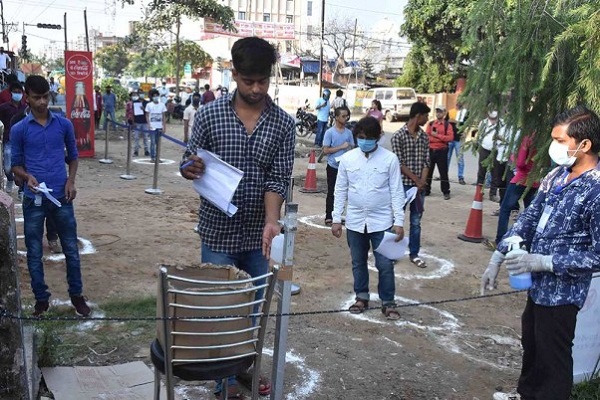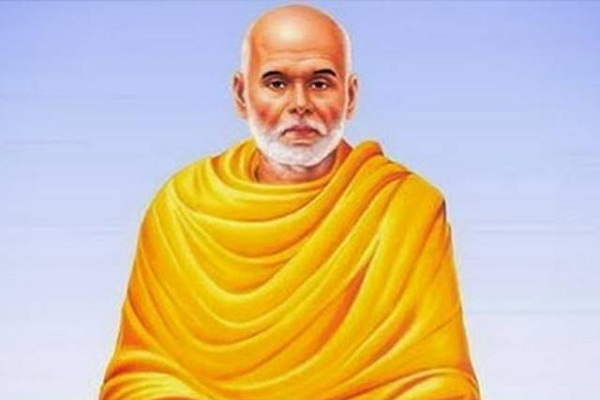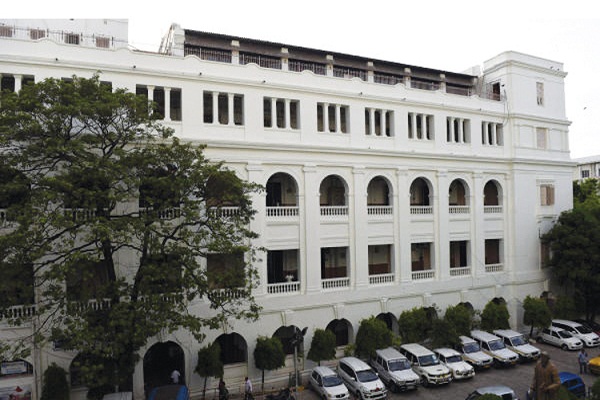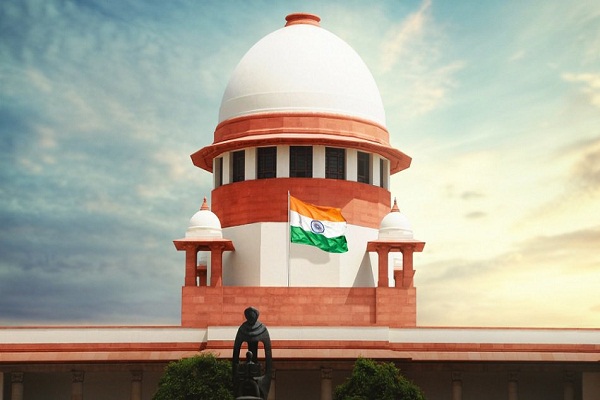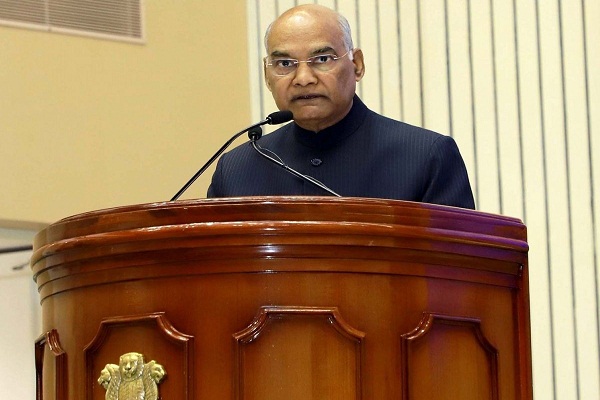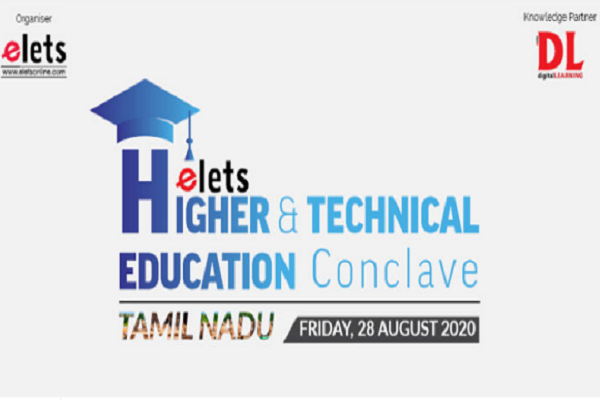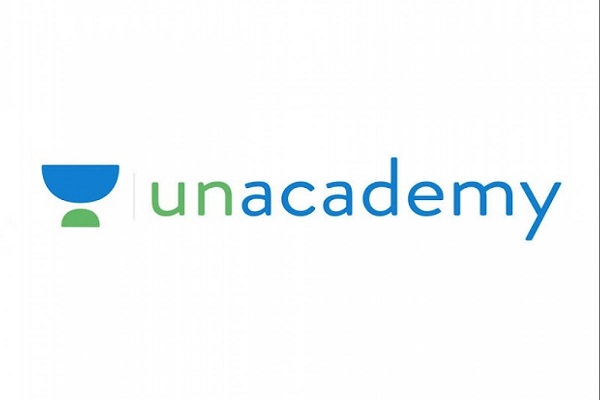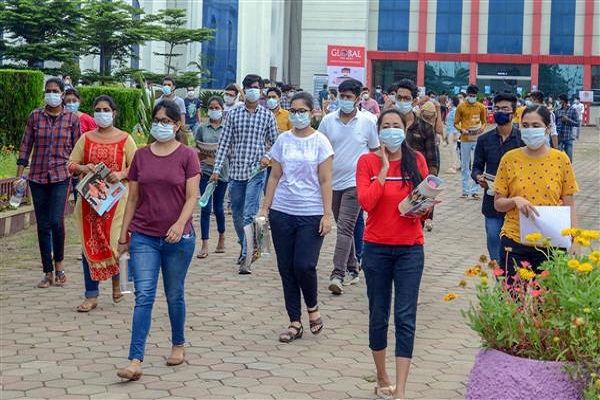In last few months, India’s education system has changed its shape and size with COVID-19 pandemic. India is moving towards a knowledge-driven economy, its strength depends upon the capabilities of its citizens. The usage of technology will help in creating an environment for learner-centric education and highlight creative thinking. To revolutionize education the integration of technology in teaching has become the need of the hour.
Elets digitalLEARNING magazine organized virtual “Higher and Technical Education Summit, Tamil Nadu” on August 28, 2020. The full-day summit highlighted the usage of technology in the Higher Education sector.
In the inaugural session Dr Ravi Gupta, CEO & Editor-in-Chief, Elets Technomedia welcomed the eminent speakers.
In the inaugural session, speaking over the Dr. M. S. Shyamasundar, Advisor, National Assessment & Accreditation Council (NAAC) said “All the HEIs have gone for online teaching due to COVID-19 crisis. The National Education Policy also advocates usage of technology in Higher Education. It will also help to make India self-reliant. The policy will bring revolutionary structural changes in Indian education system and change the sector to holistic, flexible and it is student-centric”.
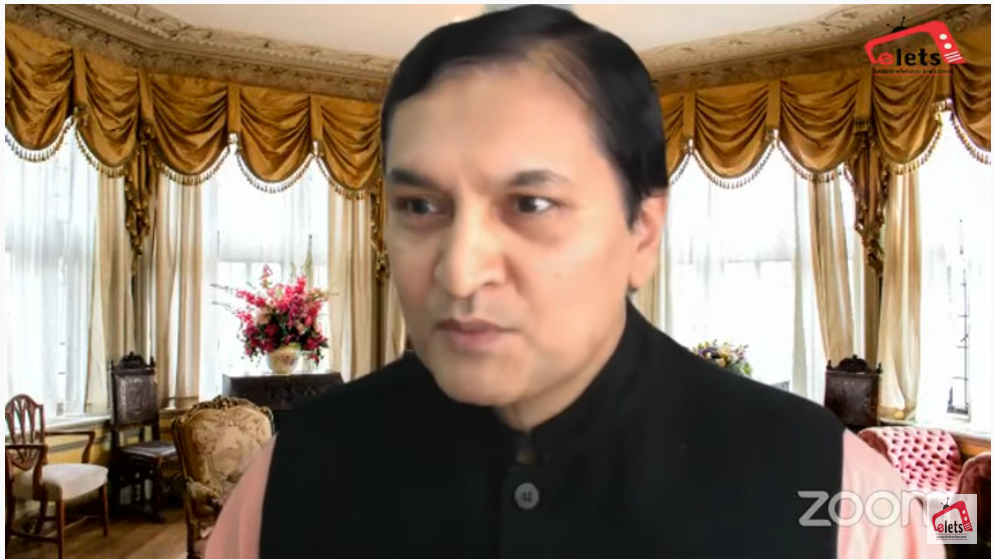
Dr Shyamasundar also said, “The academic bank account for students is one of the best things in policy. The credits can be deposited in the digilocker. Now students can do one-year PG, which is one of the best things. Now the govt is focusing on multi-disciplinary subjects and can pursue his passion with studies. The objective of the NEP is to inculcate skills within students. “
Elaborating the NEP, he said “Cooperation of all state govts is necessary to implement the much-needed policy across the country. Now autonomous colleges can award degrees. The govt wants to surge the GER to 50 pc across the country. “
Over foreign Universities, he said “With NEP, the govt is trying to attract foreign universities to India. The objective is to provide international exposure to our students.”
He also said challenges are different in education and by March 2021 many things will be taken care of. The NEP will help India to become “Vishwa Guru”. Everything cannot be implemented overnight, it will take some time to get going.
In the second session, the discussion emphasized on “Decoding Future of Technology in NEP 2020 – Approaches, Opportunities & Challenges.”
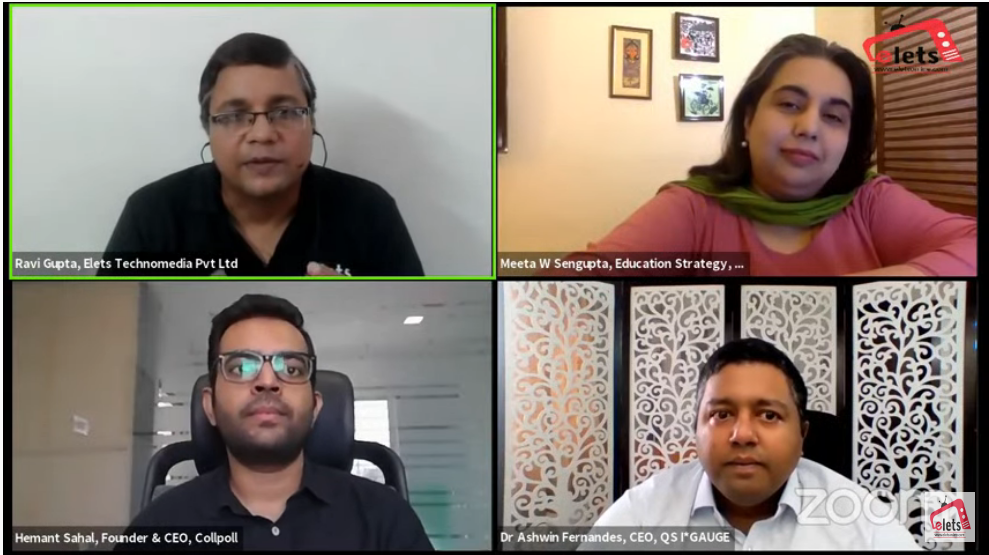
Over National Education Policy, Dr Ashwin Fernandes, CEO, QS I∙GAUGE said “The NEP will revolutionize the education sector. In unprecedented times, technology has act as saviour. The introduction of NEP has been good in this crisis. It has broken language barrier within in students. Technology can be an effective tool in schools education also. The technology will change the dynamics of higher education.”
Dr Ashwin also said, “The HEIs must be looking to build new things for future disruptions. In rural India only 2.3 pc houses have computers and urban has 23 pc. A lot of ground work to be done to implement the NEP 2020. The digital divide is a huge challenge, which the govt has to work upon in coming days.”
“In our survey 50 pc students in the country have poor connectivity. The important questions are how we can achieve 6 pc GDP and how foreign universities can fit in India? In coming days to achieve some goals, we need more investments in the sector”, he added.
“Technology can help in managing many things in universities, from admissions to internships. The new innovations have got things beyond the classroom,” he added.
Also read: Elets Exclusive: Educators call for holistic development of students
Over future jobs, he said “Many jobs will be extinct in coming days and we must prepare our students for it. We must start teaching life skills to students and prepare them for any kind of situation.”
Over National Education Policy, Meeta W Sengupta, Education Strategy, Policy and Research said “The vision perception gap has to be bridged to welcome foreign universities to India. There will be foreign investments in Ed-tech firms as India is a huge market. Education sector will suffer the most in the crisis.”
She also said “Assessments and operational issue got first priorities in global universities. Things will not the same when foreign universities enter the Indian market. It will create tough competition within the varsities, which can enhance the quality of education in the country.
The Ed-tech firms must have some purpose, they can reduce the cost, and inculcate skills within students, she said.
“COVID came as a catalyst and exposed all the issues in our sector. Technology supportive in HEIs, focus on Higher value added. Technology can provide affordable, reasonable, and easy education across the country”, she added.
Over NEP 2020, Hemant Sahal, Founder & CEO, Collpoll said “If the GER has go up to 50 pc, we need more institutions. With foreign universities entering the market, the competition will surge. Technology will play a very large role in education sector. Now institutions will have to leverage technology for future growth.”
Over Ed-tech firms, he said “Now institutions are looking at technology as long term solutions. The ed-tech firms are growing largely in the education sector. Institutions have to rewire themselves to grow in coming days. Technology has act as a great leveller and can lower the cost of training”.
“Institutions must think to incorporate people who can understand technology. Investing on people and empowering them is also important. Institutions must have long term implementation goals. Upskilling and reskillng must be focused,” he added.
He also said institutions must create students portfolio for future. Institutions must focus on good team, long run roadmap, and technology has to be humanly, he added.
In the third session, the discussion emphasized on “Lessons from Leaders – Best practices in ensuring Seamless education amid Covid-19.”

Chocko Valliappa – VC, Sona Group of Institutions, said “The COVID-19 crisis is a blessing for digital education in the country. It has accelerated the usage of technology in education. In digital class, everyone is sitting on front row. We have adopted online classes way back. We have used technology to hold assessments in our university.”
Dr Anand A Samuel, Vice Chancellor, Vellore Institute of Technology, Vellore said “The pandemic has disrupted our path. We didn’t face any issue as we have our digital infra placed two years back. We have completed all our portions on time. Not only completed our portion, have also conducted our assessments in this pandemic. The pandemic has created digital revolution in the country.”
Over conducting online classes, he said “Online mode has very less retaining capacity. Online mode classes must not be more than 30 mins. Knowledge and compression must be there for online classes. Institutions must adapt flip classroom technology to sustain.”
The digital mode has created huge flexibility in education sector. In coming days, many more innovations can change the scenario of the sector, he added.
Prof. S. Salivahanan, Vice Chancellor, Vel Tech Rangarajan Dr.Sagunthala R&D Institute of Science and Technology, Chennai said “The face to face teaching is being avoided due to COVID crisis. With technology, faculty members can use pre-recorded lectures for students. In online classes, communication skills of students can get affected.”
Raising concerns over digital infra, he said “Over 70 pc student are deprived of gadgets which is a concern. We need to bridge the digital gap across the country.”
Over teachers, he said “Technology cannot replace any teacher and it can only assist them. Face to face learning cannot be replaced at anytime. Training teachers will be a humongous task for the govt to implement the policy effectively.”
Life skills are more important than degrees and its universities job to prepare students for employability, he stressed. Conducting assessment in this pandemic will be a huge challenge for many, he added.
Prof. Dr. P. Kaliraj, Vice Chancellor, Bharathiar University, Coimbatore said “The COVID-19 has created a platform, for survival of the fittest. No technology can replace the physical classes. The Universities must prepare students for future jobs. We need to educate our teachers to adopt the online classes. We must provide e-content to every student.”
He also said “The roadmap was created to prepare students as the job situation is going to be changed after pandemic. We have changed our curriculum to implement new things. We must be preparing our teachers for future. Globalization of education will be the new theme in coming days, he added.
Over the role of varsities, he said University must adopt villages to train students. We must empower villages with education and provide them support in this crisis.
Dr. T. Sasipraba, Vice Chancellor, Sathyabama Institute of Science and Technology, Chennai said “The COVID has compelled us to make changes in every sector. The assessment is a huge issue especially in online mode. Technology has helped us to conduct the classes in this pandemic. We have to adopt blended learning in coming days. The COVID has made us to go from real to virtual mode.”
She also said Institutions must prepare students industry ready and for future jobs. The institutions must bring beyond the conventional courses and think of something new.
The pandemic has made importance of blended learning and adapt will be the new word for many, she added.
She even asked to make online lectures bit interesting and prepare students and teachers for online behavior as its very important.
In the post lunch session, the discussion was focused on “Tackling the Innovation in Admission, Enrolment, Assessment & Accreditation”
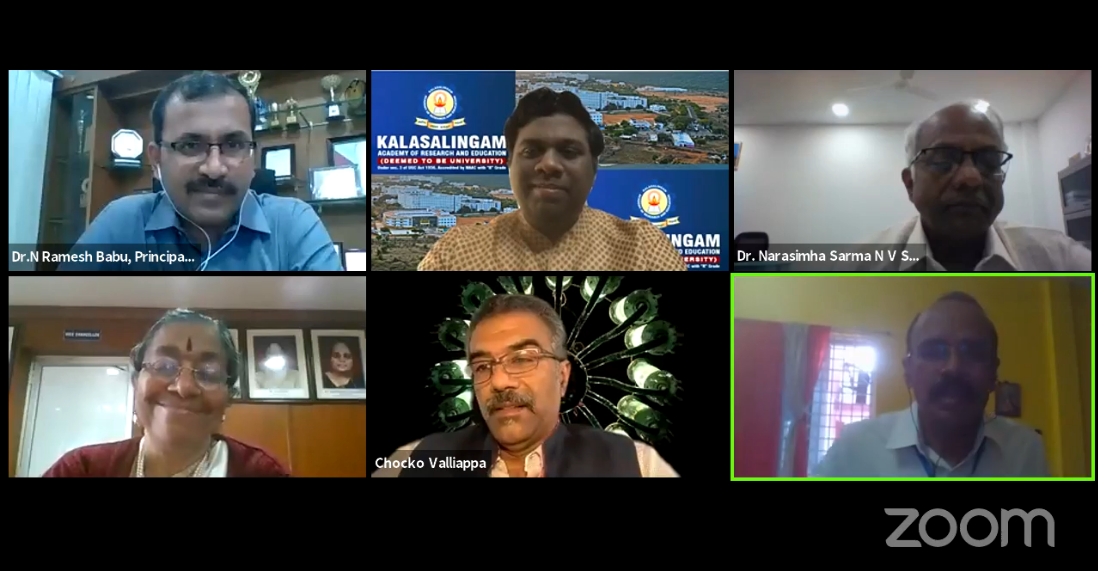
Dr Shasi Anand Sridharan, Vice President, Kalasalingam University, Krishnankoil said “There is an uncertainty seen across the country. The start of new batches will get delayed due to pandemic. We are still waiting guidelines from Centre, how to engage students in online classes. The feeling of moving into Higher Education is also important. Now, students need to learn new things.”
Dr Sridharan also said “Regular assessment is the key. The classroom atmosphere is completely changed in online classes. Faculty training is also very important as they are very new to the mode. We must be ready to embrace any situation.
Dr K.Manivannan, CEO, Mohamed Sathak Group of Institutions, Ramanathapuram said “There are lots of issues within the Higher Education in this pandemic. The faculty members learnt new technologies to carry out classes. Faculty members are finding it difficult in conducting the assessments. Now, many universities have started virtual labs for students. “
Over connectivity, he said “The connectivity is a huge issue for as over 50 pc students come from rural areas. We need to bridge the gap between the rural and urban students. ‘Education for all’ must be our motto in this pandemic .”
“The learning things are changing and change is always constant. Institutions must develop mentorship within students”, he added.
Dr. Narasimha Sarma N V S, Director, Indian Institute of Information Technology, Tiruchirappalli said “The COVID has accelerated our lives. With technology, everything is conducted online and parents and students must change their mind-sets and accept it. Majority of people must decide the policies of the country. “
He also said exams must be conducted as no one should suffer due to some people. Assessments are an integral part of the education system, he added.
“Teachers need to change their mind-set over exams and online classes. Exams can be conducted with the help of technology. We must try to pull out the real content during the assessment, what the student has understood”, he added.
Dr Vaidehi Vijayakumar, Vice Chancellor, Mother Teresa Women’s University, Kodaikanal said “Now students are trying to choose colleges near their homes. To negate it, universities must start online classes. With technology taking centre stage, we are inviting world class educators to provide their services.”
Over online classes, she said “We must prepared e-lectures, which can help many in longer run. We must try to conduct open book exams in this pandemic. Technology can be used to support students in many ways.
Dr. N Ramesh Babu, Principal, M Kumarasamy College of Engineering, Karur said “There are lot of ambiguity among the students during the pandemic. The core engineering courses may take hit in coming days. Learning will be there but the mode will change. The digital media will play an important role in admissions.”
He also advised the domestic universities to scale up the standards to retain students from going aboard for studies. He also said, colleges must prepare students for jobs which don’t exists.
In the last session, Roadmap for Building Progressive, Innovative & Skilled Future of Students was discussed.

Dr. R.M. Suresh, Pro Vice Chancellor (Academics), Bharath Institute of Higher Education and Research, Chennai said “Teacher is a peer, friend, motivator and plays many roles in a students’ life. Teacher cannot be replaced with any technology. If a teacher enhances himself as a winner, then he can change the society.”
He also advocates preparing counselling cell for students during this pandemic. Things can change drastically, teachers must prepare students to tackle any kind of situations, he added.
Dr. S. Padmavathi, Principal, Shri Shankarlal Sundarbai Shasun Jain College for Women, Chennai, said “We must focus on holistic method of learning. We must focus on unlearn students over some issues, liberalize them to choose subjects, change the learning methodologies, bring in blended learning technologies, value addition and provide skill development. The role of teacher is very important in developing a student. If teachers start learning, then we can create a good nation”.
Teachers will play an important role in redefining education in the country. With good teachers, things can change a lot in coming days, she added.
Prof. (Dr.) Kuncheria P. Isaac, Vice Chancellor, Hindustan Institute of Technology & Science (Deemed to be University) Chennai, said “The NEP is the roadmap for grooming good citizens for our country. We have been listening knowledge is the power and ethics has to be in the education sector. We need to inculcate values within the students. We must focus on building person with creativity and communication skills.”
He also said “We need to recoginse a good leader and train students for future.AI is also very important and will play crucial role in coming days.”
Learning is a continuous process and we have to change our mindset. The technology is changing and will provide lifelong learning to students, he added.
Dr. K. Maran, Director, Sairam Institute of Management Studies, Sai Ram Engineering College, Chennai said “Without education nothing is possible. We need to empower every individual. Without knowledge and skills nothing can be done. We need to change our curriculum as without it we cannot provide international standards to students. We must prepare our students in many dimensions and enhance skills. We must prepare them for industry ready as its needs are changing.”
“Student attitude and presence of mind is very important. Now it’s about 360 degree student, focus more on social aspects, teaching is a powerful tools, the statics has to be changed”, he added.
Dr. V. Venkatachalam, Principal, Erode Sengunthar Engineering College, Erode said “The changing needs of the industry must be addressed by the institutions. The National Education Policy is focusing on vocational training. We need to bring change in our curriculum and bridge the gap between institutes and industry. We must ask our faculty members to change their mind set. We must bring in new innovations in our curriculum.”
Institutions must include Data Science and AI in their courses. Teachers have to be updated and trained on regular basis, so that they can prepare students for the future, he added.







